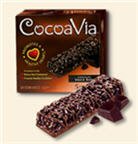 CocoaVia Crunch is a chocolate-based "heart-healthy" snack line marketed by Masterfoods USA since Oct. 2005. This kind of snack bar is enriched with plant-derived compounds called phytosterols. Phytosterols are plant-derived compounds that are structurally similar to the cholesterol found in mammals. Foods (such as margarine spreads) containing phytosterols have been shown to help cut cholesterol.
CocoaVia Crunch is a chocolate-based "heart-healthy" snack line marketed by Masterfoods USA since Oct. 2005. This kind of snack bar is enriched with plant-derived compounds called phytosterols. Phytosterols are plant-derived compounds that are structurally similar to the cholesterol found in mammals. Foods (such as margarine spreads) containing phytosterols have been shown to help cut cholesterol. A latest study has concluded that eating CocoaVia Crunch snack bar can reduce people's bad cholesterol by 6%.
Considering CocoaVia's great chocolate taste (it comes from the makers of DOVE brand), it's richness in naturally occurring flavanols (which improve blood flow - similar to grape juice, red wine and green tea), I don't think I will eat chocolate bar of any other kind.
